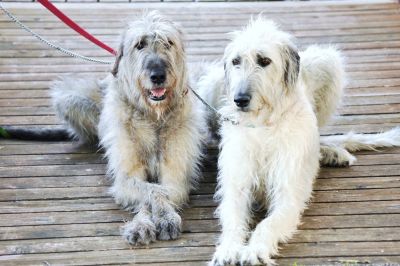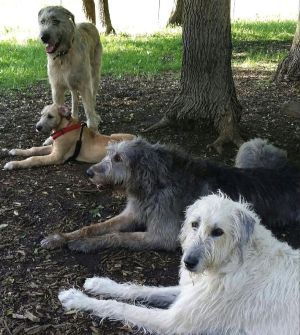Canine Blood Donation
Canine transfusion medicine is an important, life-saving tool. Whole blood transfusions are used to treat anemia such as blood loss following an accident or during surgery, conditions where the body does not make enough red blood cells, or immune-mediated destruction of the red blood cells (known as immune-mediated hemolytic anemia or IMHA). Plasma transfusions contain all of the proteins and enzymes of blood without the red blood cells and are used to treat bleeding disorders or severely low protein levels.
Working in the intensive care unit at the University of Minnesota Veterinary Medical Center, certified veterinary technician Beth Olmstead uses blood products on a regular basis while treating trauma cases, chronic conditions like IMHA, and incidents of rodent bait toxicity (many baits affect blood clotting factors in dogs). She notes, “There is a nationwide shortage of canine blood products. Having a local blood bank is vital to patient care at our hospital.” As supervisor of the University’s Companion Animal Blood Donor Program, Beth is also working to meet that demand.

There are numerous veterinary blood banks in the United States, similar to the one at the University of Minnesota, that collect, store, and provide blood products to patients in need. The majority of these veterinary blood banks rely on client-owned pet dogs to ‘volunteer’ as donors.
“I’ve had the experience of having more than one dog needing emergency surgery - one for a bowel obstruction, one for bloat, one after being hit by a car, and one after birthing a litter,” states Irish Wolfhound owner and canine blood donation advocate, Denise Ratzlaff. “I choose to participate in a blood donor program because it is critical when your dog needs emergency surgery to have blood on hand for the best outcomes. I am so thankful for those who have donated before me, who helped my dogs in their time of need.”
The canine blood donation experience –
If you are interested in participating in a canine blood donor program with your dog(s), you can search for a veterinary blood bank near you on the Association of Veterinary Hematology and Transfusion Medicine’s website at avhtm.org/resourceslinks or by contacting the nearest veterinary teaching hospital. The exact donation requirements and process will vary, but in general:
-
Your dog must be young and healthy, exceed the minimum weight requirement, and be accepting of the process and able to lie still for 5-15 minutes.
-
Your dog will receive a complete physical examination and other laboratory tests to confirm he/she is healthy enough and free from infectious diseases to participate as a donor. This is valuable information on the health of your dog and is one of the benefits of participating in a donor program.
-
Approximately 450ml (one pint) of blood will be collected from the dog’s jugular vein (on the front of the neck) while the dog sits or lies still for 5-15 minutes. Dogs are not sedated, and the entire appointment usually takes less than 30 minutes.
-
Your dog may be asked to donate on a regular basis or be available to donate as needed.
-
Depending on the blood bank, you may receive additional rewards such as dog food or heartworm prevention, and your dog may be eligible for free or discounted blood products if they ever need to receive a transfusion.
At Minnesota, Olmstead and her team always try to make blood donation a positive experience for their volunteer dogs and owners. She says, “Our donors are usually big, healthy, happy dogs wagging their tail the whole time. If they show any signs of fear or resentment, we stop!”
Ratzlaff and her dogs are happy to participate in the University of Minnesota’s Companion Animal Blood Donor Program. “Aside from a patch of shaved hair, there is no downside. I am thankful for the opportunity to give back,” she states.
If your dog’s temperament is amenable to blood donation, you will likely find the experience rewarding – because of the health benefits to your own dog and the knowledge that you helped save numerous other dogs’ lives!
Canine blood types –
Blood typing and crossmatching are important to minimize the recipient’s risk of an adverse response to a blood transfusion, known as a transfusion reaction. Transfusion reactions can be mild, such as fever and vomiting, or severe, including, cardiovascular shock, difficulty breathing, and immune-mediated destruction of the transfused red blood cells. Canine blood typing is offered at many laboratories and crossmatching is also available at laboratories or through in-clinic test kits. Crossmatching tests for antibodies in the recipient’s plasma against the donor cells. A major crossmatch incompatibility means an acute transfusion reaction is likely.

Dogs have at least twelve known blood types. The majority are named as dog erythrocyte antigen, or DEA, with DEA 1.1 being the most reactive, and therefore the most studied blood type. DEA 1.1 positive dogs can only donate to other DEA 1.1 positive dogs. DEA 1.1 negative dogs are considered “universal blood donors” and can safely donate to dogs that are DEA 1.1 negative or positive. Only a small percentage of dogs are DEA 1.1 negative, but Greyhounds, Boxers, Irish Wolfhounds, German Shepherd Dogs, Dobermans, and Pit Bulls are breeds more likely to be universal donors.
Ongoing canine blood disorder research –
The AKC Canine Health Foundation (CHF) is a non-profit organization dedicated to advancing the health of all dogs and their owners. The Foundation provides funding for canine health research in twenty-three different research program areas, including blood disorders. Outcomes from this research have impacted the diagnosis of bleeding disorders in dogs such as von Willebrand Disease and hemophilia, and better defined the incidence and inheritance of the relatively new Dal canine blood type, discovered in 2007. Currently active CHF-funded blood disorder research includes:
- Grant 02637-A: Reducing Misdiagnosis of Immune-Mediated Hemolytic Anemia
Investigators are evaluating if changes to the saline agglutination test (used to diagnose immune-mediated hemolytic anemia) can reduce the incidence of false positive results and prevent misdiagnosis of this common life-threatening disease. - Grant 02536-MOU: Immunoprofiling to Combat Canine Immune Thrombocytopenia
Investigators are using genetic testing to identify laboratory markers that predict bleeding severity in dogs with immune-mediated thrombocytopenia (platelet destruction) in order to aid in treatment selection. - Grant 02348: Whole Blood Transcriptome Profiling of Dogs with Immune-Mediated Hemolytic Anemia (IMHA)
Investigators are studying which genes are active in the blood of dogs with newly diagnosed IMHA, but not in the blood of healthy dogs. Results may demonstrate novel treatment targets.
How can you help?
Learn more about your local canine blood donor program through the links listed above and support canine health research through the AKC Canine Health Foundation at www.akcchf.org/donate. However you choose to contribute, you can take part in creating a future where all dogs live longer, healthier lives.
Study outcome: CHF-funded research exploring safe storage times for canine blood used in the treatment of anemia found no clinical benefit to using fresh RBC transfusions in dogs with underlying, baseline hemolysis. Learn more here.
Related Articles
Help Future Generations of Dogs
Participate in canine health research by providing samples or by enrolling in a clinical trial. Samples are needed from healthy dogs and dogs affected by specific diseases.



